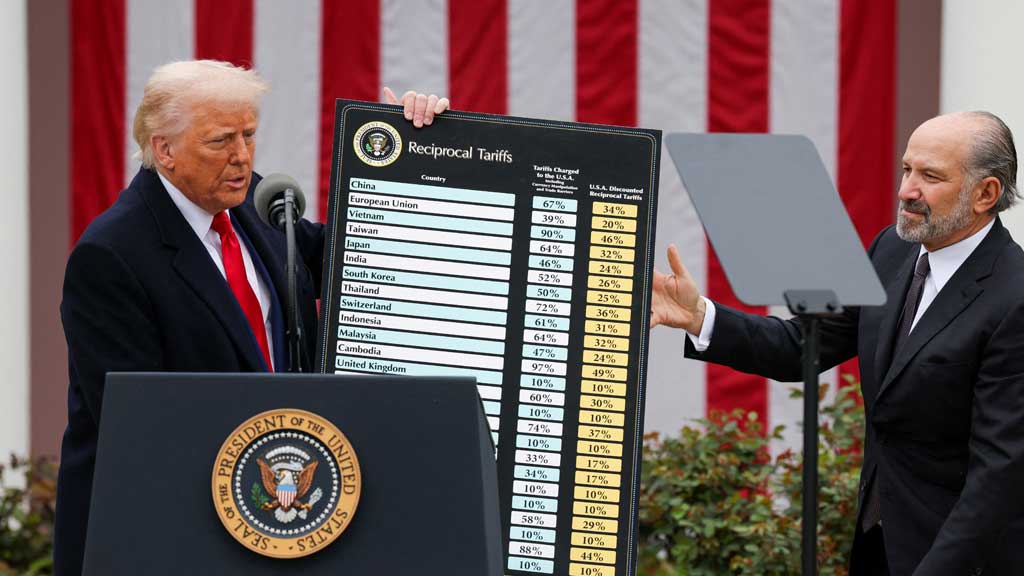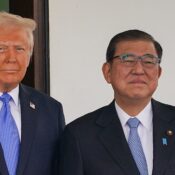
Trump warns of increasing tariffs on China as market decline persists
A global trade war initiated by U.S. President Donald Trump’s extensive tariffs intensified on Monday, as Trump warned of raising duties on China while the European Union suggested implementing its own counter-tariffs.
Financial markets worldwide experienced a third consecutive day of losses as investors expressed concerns that significant trade barriers surrounding the world’s largest consumer market might trigger a recession. The S&P 500 finished the day lower after a tumultuous session that saw it reach its lowest point in over a year.
Trump stated that the tariffs, starting at a minimum of 10% for all U.S. imports and with specific rates reaching as high as 50%, would assist the United States in reclaiming an industrial base that he claims has diminished over years of trade liberalization.
“This is our nation’s sole opportunity to start anew.” “No other president would be willing to undertake what I’m doing, or even endure it,” he stated to reporters at the White House. “I am willing to endure this process as I envision a stunning outcome awaiting me.”
Trump addressed the situation shortly after intensifying tensions with China, the second-largest economy globally.
On Wednesday, Trump announced that he would implement an extra 50% duty on U.S. imports from China unless the country retracted the 34% tariffs it had recently placed on U.S. goods. The Chinese tariffs were implemented as a reaction to the 34% “reciprocal” duties declared by Trump.
Beijing reacted with a bold stance. Liu Pengyu, a spokesperson for the Chinese embassy, described Trump’s threat as a “typical move of unilateralism, protectionism and economic bullying.”
“We have emphasized repeatedly that pressuring or threatening China is not an appropriate way to engage with us,” he added. “China will steadfastly protect its rightful rights and interests.”
The European Commission has proposed counter-tariffs of 25% on various U.S. goods, such as soybeans, nuts, and sausages. However, other potential items, including bourbon whiskey, were not included in the list, as reported in a document reviewed by Reuters.
Officials expressed their preparedness to engage in negotiations for a “zero for zero” agreement with Trump’s administration. “At some point, we will engage in negotiations with the U.S. and reach a compromise that works for both sides,” stated EU Trade Commissioner Maros Sefcovic during a news conference.
The 27-member bloc is currently grappling with existing tariffs on automobiles and metals, and is set to encounter a 20% tariff on additional products this Wednesday. Trump has threatened to impose tariffs on alcoholic beverages from the EU.
U.S. Treasury Secretary Scott Bessent met with Trump in Florida on Sunday, according to Politico, to encourage him to focus on securing trade deals with partners to reassure the markets that there is a clear endgame to the U.S. strategy.
Trump announced that his administration plans to initiate trade discussions with Japan, a key ally of Washington in Asia. Officials from the administration report that numerous other countries have also expressed interest in engaging, aiming to prevent the implementation of tariffs that could reach as high as 50%, set to take effect on Wednesday.
The ongoing exchanges have added to the volatility in global financial markets, which have been on a steady decline since Trump’s announcement.
Officials from the Trump administration assert that the president is delivering on his commitment to undo years of trade liberalization, which he contends has weakened the U.S. economy.
“He’s reaffirming a strategy that he understands is effective, and he plans to persist with it,” stated White House economist Kevin Hassett during an appearance on Fox News. “However, he will also pay attention to our trading partners, and if they present us with truly beneficial deals that favor American manufacturing and American farmers, I am confident he will consider them.”
China’s retaliatory levies represent the strongest response to Trump’s announcement, which has elicited confusion and condemnation from other leaders.
Following a significant decline in stocks across mainland China and Hong Kong on Monday, China’s sovereign fund intervened in an effort to stabilize the market.
Shares in Taiwan fell nearly 10% – marking the largest one-day percentage decline ever recorded.
Leaders on Wall Street have raised alarms regarding U.S. tariffs, with JPMorgan Chase CEO Jamie Dimon cautioning that they may result in enduring adverse effects. Meanwhile, fund manager Bill Ackman warned that these tariffs could usher in a “economic nuclear winter.”
Ackman stands out among a select group of Trump supporters who have raised questions about the strategy. Billionaire Elon Musk, who is spearheading Trump’s initiative to reduce government spending, advocated for the elimination of tariffs between the U.S. and Europe over the weekend.
On Monday, Trump trade adviser Peter Navarro referred to the Tesla CEO as merely a “car assembler.”
IS IT A NEW REALITY OR JUST A NEGOTIATING TACTIC?
Investors and political leaders have grappled with the question of whether Trump’s tariffs are a lasting measure or merely a strategy to extract concessions from other nations.
There are concerns among some in the EU that a strong reaction could lead to increased backlash against European exporters, affecting products ranging from French cognac and Italian wine to German cars.
Volkswagen’s Audi is delaying the release of cars that reached U.S. ports after April 2 due to the recently implemented 25% auto tariff. Howmet Aerospace (HWM.N), an aircraft parts supplier, may suspend certain shipments if they are affected by tariffs, as indicated in a letter reviewed by Reuters.
Several Asian governments have indicated a readiness to participate.
Taiwanese President Lai Ching-te proposed zero tariffs as a foundation for discussions on Sunday, while an Indian government official indicated that Delhi has no intention of retaliating.
Investors are increasingly wagering that the rising threat of recession may lead the U.S. Federal Reserve to lower rates as soon as next month. On Monday, Trump reiterated his request for the central bank to reduce rates, yet Fed chief Jerome Powell has thus far suggested that he is not in a hurry to do so.
All Categories
Recent Posts
Tags
+13162306000
zoneyetu@yahoo.com



